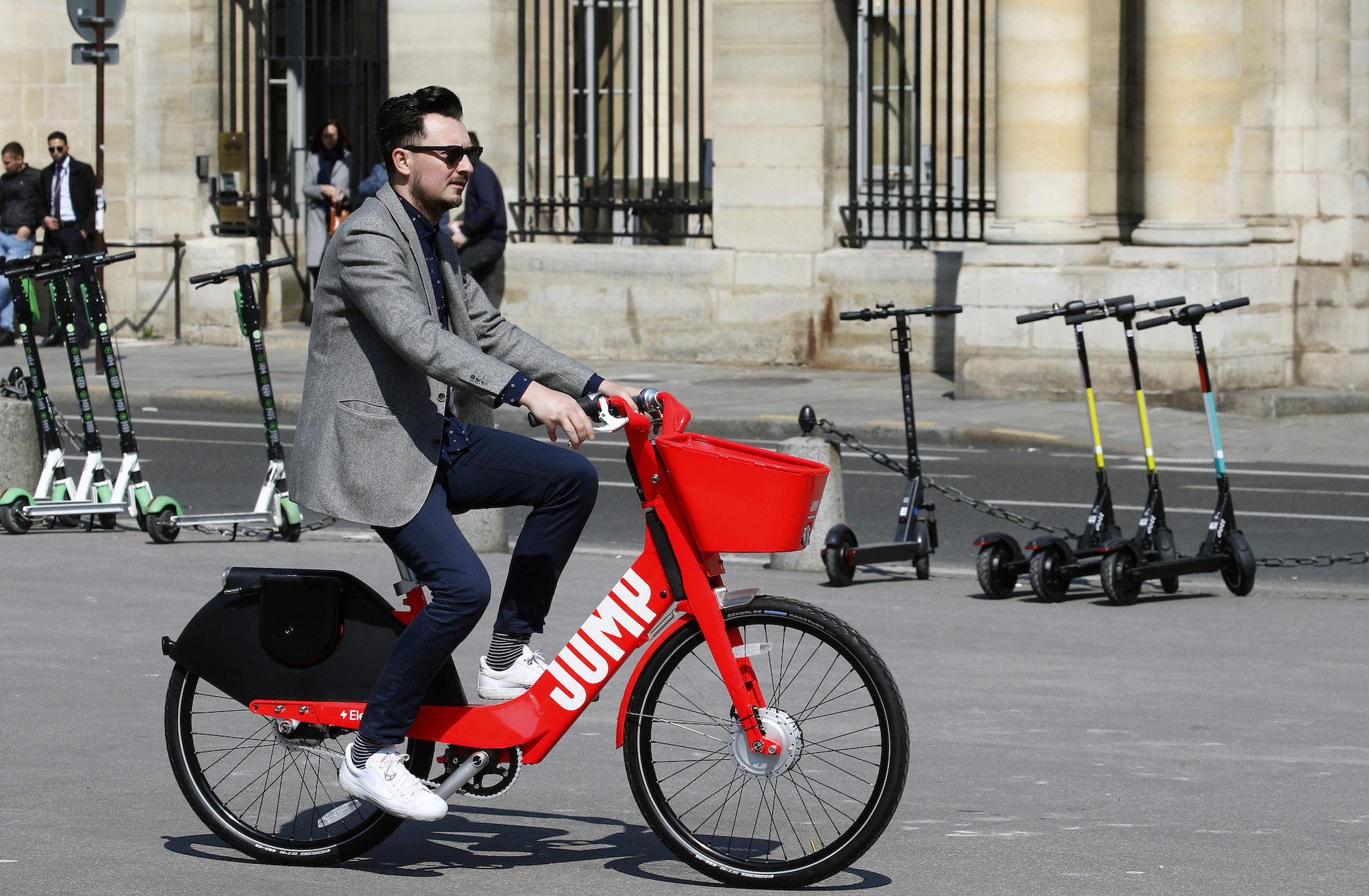Uber start destroying 20,000 Jump bikes after recycling proves too complicated
Videos of the bikes being crushed rather than repurposed have emerged on social media

A man rides an Uber Jump bike in Paris, France (Photo by Chesnot/Getty Images)
Uber is destroying tens of thousands of its electric Jump bikes after selling part of its bike hire business to Lime and the bicycles proved surplus to requirement.
Videos of the red bikes being crushed at a recycling centre in the USA emerged on social media, with Uber saying the decision was made to destroy its older models because of maintenance, liability and safety issues.
The decision to scrap the bikes has been criticised by charities who have suggested the bikes could have been donated to those in need or even sold to individuals to kickstart the electric bike revolution.
The coronavirus pandemic is set to reduce public transport capacity and put greater emphasis on bike transportation, but global supply disruptions in bike manufacturing will lead to a "severe bike shortage" in the USA, according to the New York Times.
>>> More power and longer life… should you be getting your frame faced?
The sale of Jump to Lime, another bike-sharing company, appears to affect the US portion of the business as Uber will continue to operate the Jump bikes in the UK and has not scrapped any that have been present on British streets.
As part of the deal, Lime received tens of thousands of Jump bikes as well as intellectual property, yet there were still thousands of bicycles that were not transferred over. In addition to the sale, Uber led a $170m investment round in Lime, which saw the bike-sharing company's valuation fall by nearly 80 per cent.
Get The Leadout Newsletter
The latest race content, interviews, features, reviews and expert buying guides, direct to your inbox!
Uber had bought Jump in 2018 for $200 million, which had 12,000 bikes in 40 cities across six countries, but was a money loser, and the bike-sharing company has recently laid off most of its 400-plus employees.
"We explored donating the remaining, older-model bikes," Uber said in a statement. "But given many significant issues - including maintenance, liability, safety concerns, and a lack of consumer-grade charging equipment - we decided the best approach was to responsibly recycle them."

Thank you for reading 20 articles this month* Join now for unlimited access
Enjoy your first month for just £1 / $1 / €1
*Read 5 free articles per month without a subscription

Join now for unlimited access
Try first month for just £1 / $1 / €1
Jonny was Cycling Weekly's Weekend Editor until 2022.
I like writing offbeat features and eating too much bread when working out on the road at bike races.
Before joining Cycling Weekly I worked at The Tab and I've also written for Vice, Time Out, and worked freelance for The Telegraph (I know, but I needed the money at the time so let me live).
I also worked for ITV Cycling between 2011-2018 on their Tour de France and Vuelta a España coverage. Sometimes I'd be helping the producers make the programme and other times I'd be getting the lunches. Just in case you were wondering - Phil Liggett and Paul Sherwen had the same ham sandwich every day, it was great.
-
 'It took everything' - Puck Pieterse outclimbs Demi Vollering to win La Flèche Wallonne
'It took everything' - Puck Pieterse outclimbs Demi Vollering to win La Flèche WallonneDutch 22-year-old shows Classics pedigree with first one-day victory
By Tom Davidson
-
 Tadej Pogačar flies to dominant victory at La Flèche Wallonne
Tadej Pogačar flies to dominant victory at La Flèche WallonneSlovenian takes second win at Belgian classic ahead of Kévin Vauquelin and Tom Pidcock
By Tom Thewlis